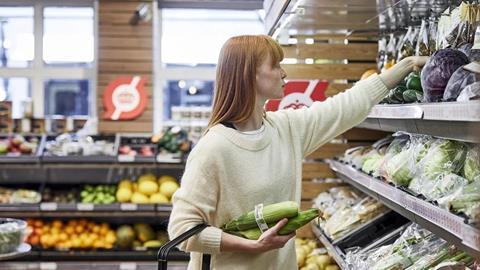Denmark outdoes other European countries including France, Germany and Italy when it comes to buying organic food, a trend highlighted at a recent event in Copenhagen organised by Made in Nature
Practically all Danes, 99.7 per cent of them to be precise, buy organic on a daily basis. That’s according to Carsten Ahrenfeldt, head of market at Organic Denmark, the leading association of organic farms, growers and consumers.
That surprising figure was highlighted during a recent event in Copenhagen called Organic Fruits and Vegetables in the Retail Chain: Where do we stand?
The event, which was simultaneously broadcast online in Italy, France and Germany, was organised by Made in Nature, a promotional and educational programme for organic fruit and vegetables managed by CSO Italy and co-funded by the European Union.
The following companies also participate in the project: Brio, Canova, Ceradini, Conserve Italia, Orogel and Verybio.
The Made In Nature campaign mainly involves four European countries: Denmark, France, Germany and Italy, and it was precisely these countries that were the focus of the event.
Among the world’s top ten most organic countries, Denmark ranks first. France and Germany stand in fifth and sixth place respectively. Italy closes the list in tenth.
Thus, it is precisely the Danes who are the biggest organic buyers and this trend is across all ages and segments of the population: families with children; young families (18-39 years old) without children; adult families without children (40-54 years old); and elderly couples or elderly singles (55+ years old) without children.
In short, according to Denmark Association data, the consumption of organic products is ageless.

Range is important
For the Danes, the range of organic products is considered important and even more so for the younger generation (especially the 18-34 age group).
The highest share of organic products is found in fruit and vegetables with 29 per cent; further down are dairy products with 19 per cent and groceries with 17 per cent. Fruit and vegetables are an important traffic driver, directing Danish consumers to the point of sale far more than other products such as dairy products.
According to data released by CSO Italy, 308,000 tonnes of organic fruit and vegetables were purchased in Italy in 2022, the lowest quantity in the last five years and compared to conventional, with an average price increase of +3 per cent, rising to €2.22/kg in 2022.
From 2018 onwards, however, the share of organic within the total fruit and vegetable purchases has remained stable at an average of 6 per cent of the total.
Major retailers represent the main outlet for organic fruit and vegetable sales: 64 per cent of the volume passed through a point of sale belonging to hyper, super, discount or mini-mart. In absolute terms for 2022, this was 198,000 tonnes of the 308,000-tonne total.
Supermarkets with 42 per cent of sales and discounters with 12 per cent were the only channels with growth compared with the previous year.
Organic under pressure
Although it ranks last in terms of purchase of organic products, Italy is among the first European countries in terms of agricultural surface area cultivated organically, with 22,000 sq km (Source: Organic farming in the EU from the European Commission).
In Germany, the market for organic fruit and vegetables in 2022 showed a 1 per cent increase in the average price compared to the previous year, even though both overall turnover and production were down compared to 2022.
But this was in line with the 2021 figures and slightly up compared to the previous years (2020 and 2019). It should be noted, however, that potatoes are not counted in these figures.
According to the Barometer of Agence Bio (the French Agency for the Development and Promotion of Organic Agriculture), despite its many advantages, organic food is suffering.
In a highly competitive environment, supermarket chains tend to rationalise their organic assortment in favour of other offers. This decline is also reflected in the results: the percentage of regular organic consumers – those who buy organic food at least once a week in supermarkets – is down by 6 points compared to 2021.
But despite difficult times around the globe, consumer confidence seems to be rising steadily.
“The purchase of organic fruit and vegetables in the first quarter of 2023 showed a decrease of 7 per cent compared to 2022,” says Elisa Macchi, director of CSO Italy.
”However, it should be noted that the families that have been approaching organic products for several years, allowing an important growth, are not decreasing. What is decreasing is the volume purchased per purchasing family, confirming that it is the general inflation that is ‘biting’ consumption.”




